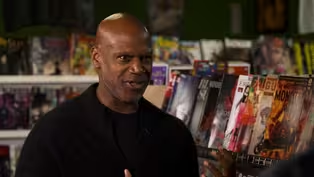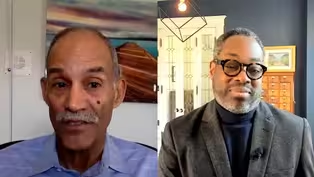
Rose Morton traces her ancestry in ‘Our Family’s Keepers’
Clip: Season 51 Episode 51 | 6m 27sVideo has Closed Captions
Rose Morton unravels her family’s history of slavery in her book “Our Family’s Keepers.”
For many African Americans, tracing their family’s past can come with challenges. Contributor Daijah Moss talks with author Rose Morton, a local woman who set out to learn about her enslaved ancestors and the families that owned them. They talk about Morton's quest for identity, her book “Our Family’s Keepers,” and the profound impact of her discovery on the people connected to a South Carolina pl
Problems playing video? | Closed Captioning Feedback
Problems playing video? | Closed Captioning Feedback
American Black Journal is a local public television program presented by Detroit PBS

Rose Morton traces her ancestry in ‘Our Family’s Keepers’
Clip: Season 51 Episode 51 | 6m 27sVideo has Closed Captions
For many African Americans, tracing their family’s past can come with challenges. Contributor Daijah Moss talks with author Rose Morton, a local woman who set out to learn about her enslaved ancestors and the families that owned them. They talk about Morton's quest for identity, her book “Our Family’s Keepers,” and the profound impact of her discovery on the people connected to a South Carolina pl
Problems playing video? | Closed Captioning Feedback
How to Watch American Black Journal
American Black Journal is available to stream on pbs.org and the free PBS App, available on iPhone, Apple TV, Android TV, Android smartphones, Amazon Fire TV, Amazon Fire Tablet, Roku, Samsung Smart TV, and Vizio.
Providing Support for PBS.org
Learn Moreabout PBS online sponsorshipTracing family roots has gained popularity in recent years as more people become interested in their ancestry.
A Detroit area woman who went in search of her history discovered some interesting connections and information about her enslaved ancestors and the families that own them.
"American Black Journal" contributor Daijah Moss met up with Rose Morton to talk about how she traced her roots and what she found out about that painful part of her history.
(soft violin music) - [Deijah] Rose Ella Morton's journey tracing her ancestors, took her to the Middleton Plantation in Charleston, South Carolina in 2002, where she discovered her direct relationship to a key figure in the American Revolutionary War.
- This would be my great-grandfather.
Wilford Harper Yancy, because he's the one that had a baby by, Ella.
Yeah, he had Ella.
- You did something so powerful and so unique.
You took a trip down your ancestral history, literally.
Take me back to the beginning, tell me about that.
- I was in front of my mother's house one day and I was picking up my kids and my brother was outside and he had been doing research and he had some pictures and he said, "look at this picture.
This is our last slave owner."
I said, what?
I said, let me see.
And soon as I saw the picture, I kind of like froze.
I got scared.
I couldn't understand what I was feeling.
Something about his face.
I felt he could hurt me right on the spot.
I felt like he could control me.
It was just, I was afraid and I didn't like to feeling and I felt it was really weird.
And that's what got me all involved and wanted to do my, to find out what had me so afraid.
- You tied together all of these different pieces that led you to different plantations.
You even wrote a book that highlights the story.
Tell me about your journey with acquiring all of the different documents.
- We went through the libraries.
I start doing my ancestry search on family trees and stuff and going through that.
And my brother, he had started at about 16 years old, he had, was going down to my grandmother's house in Alabama, and he would ask her, she was still alive then.
He would ask her about things and she would tell 'em stories.
At that time, I wasn't interested in everything, but then all the stories she told helped me into my journey because I started putting all that stuff together.
- And I know that of course you did a lot of the research and I know that your brother helped you along the way.
- My brother did have a couple of pictures, but he was more so he said, after I started journeying out into the slave owners, he wanted me to, he said, don't bother with them.
He said, just keep it in.
Just just find out things about the Black side, the slaves, the ancestors.
We don't want to go into that part.
And I was, I said to myself, that doesn't make sense.
I said, in order for me to find out more about my people, I gotta find the white people that had him.
So that's when I started, I took it out towards going to find the white slave owners and stuff, and going to the plantations and stuff.
I started out collecting information.
My brother had pulled up something about the plantations and everything that they were on, and it was like three plantations and the story sounded real good.
I said, you know what?
I think I'm going to visit every plantation my ancestors were enslaved.
He said, "well, if you're going to take a visit, I wanna go with you."
So that started off my first trip.
So we went to Charleston, South Carolina.
It was in February, 2002.
We went to the Milant Plantation.
- When you went back to these plantations, you were essentially in a way traveling back in time.
What was the feeling that you felt when you were there?
- As soon as I got on the ground, I could feel, like I said, I could feel it move up under my feet and everything.
It was kind of, it was beautiful, it was beautiful.
But I also know you don't go back to a ancestors' place where your ancestors was at or slave where they were slaves and died without them coming back with you.
Some coming back when you leave.
So some of 'em did follow me back, I know they did.
- So you are a part of the Daughters of the American Revolution, which not many Black women are a part of.
How did you become a part of that group?
- My great-grandmother, Ella, who I'm named after, Ella Snow, she's a product of the slave master's son.
His name was Goodlow Harper Yancy.
And she couldn't tell nobody that was her father.
Her great-grandfather, which was named James Yancy, served in the American Revolutionary War.
And so that was my connection.
- What does it mean to you to be a part of the Daughters of the American Revolution as a Black woman?
- The first Black woman, she joined the group in 1977.
And the reason that I joined was not, I'm so patriotic.
I'm not.
The main purpose, which only I care about is the taking my grandmother, great-grandmother from the position of couldn't claim her father to the father, her record being in Washington, that she is the daughter of this man.
And that's what I wanted.
- And I'm sure that you plan to pass this journey along to the generations to come.
Why is it important for them to have access to this information and to be able to continue that legacy?
- Well, I don't want them to ever be ashamed of where they came from.
And I want them to know it was very important people that they were, that were strong, that they had to be strong so they could survive.
You know, certain times bring about different feelings.
Like right now we're in the feeling where everybody wants to find out, but will they wanna find out?
Will they really care about it, I really don't know.
But if they do, everything is there for them.
Rob Edwards discusses his new graphic novel ‘Defiant’
Video has Closed Captions
Clip: S51 Ep51 | 7m 9s | Rob Edwards’ new graphic novel details a little-known story in America’s Black history. (7m 9s)
Tracing your family tree with genealogist Tony Burroughs
Video has Closed Captions
Clip: S51 Ep51 | 10m 21s | Genealogist Tony Burroughs shares resources for tracing African American family ancestry. (10m 21s)
Providing Support for PBS.org
Learn Moreabout PBS online sponsorship
- News and Public Affairs

Top journalists deliver compelling original analysis of the hour's headlines.

- News and Public Affairs

FRONTLINE is investigative journalism that questions, explains and changes our world.












Support for PBS provided by:
American Black Journal is a local public television program presented by Detroit PBS

